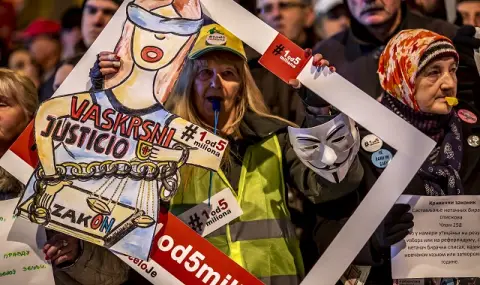Serbia a special bureau to be founded fights against the negative publications about the country in the Western media. The only problem is that most of them are true, say journalists.
Arnaud Guyon is only 38 years old, but he has a rich biography - in his mid-20s he wanted to become the president of France as a candidate for a far-right party, but he did not even manage to run because he did not raise enough signatures.
The Frenchman shows a special interest in the events of the Kosovo War of 1999 and the intervention undertaken by NATO, which is still contested today, as it was carried out without a UN mandate. "Then an entire nation is demonized," says Guyon, who has lived in Belgrade for a long time and, among other things, is involved with the Serbian minority in Kosovo. He speaks perfect Serbian, has a Serbian wife and a Serbian passport, and is also an MP from the ruling Serbian Progressive Party.
Now Guyon has a new task: he is the director of the newly founded Bureau of Public and Cultural Diplomacy. In the future, his associates will methodically screen the international media for negative material against Serbia, then contact newsrooms to polish the country's image. English, French, German and Italian languages will be used.
"Those who are used to publishing lies and negative opinions about the events in the Balkans and in Serbia should now know that they will get an answer from us every time," the newly appointed director told the Belgrade newspaper "Vecherni Novosti" , which is the unofficial mouthpiece of the Serbian government.
Is the image of Serbia unreasonably bad?
Serbia's image in the foreign media is not good, which, according to President Aleksandar Vucic and his government, is not justified. Vučić, who has turned the country into an autocracy, stifles the free media, the independent judiciary and the opposition, and public contracts and offices are given only to people with the right party card.
Western media also often describe Vucic as a "provocateur". His idea of a "Serbian world" with areas of influence in Kosovo, Montenegro and Republika Srpska is often defined as explosive.
"The stereotypes of the Yugoslav wars in the 1990s" also play a role in today's presentation of Serbia in the international media, says political scientist Milan Krstic from Belgrade. "This will not be easily changed. Then everything was presented only in black and white, without shades - the Serbs are the executioners, the others are only victims."
"North Korean Propaganda Bureau"
Serbia really needs to improve its image, Krstic told DV. But not as planned by Guyon: "The emphasis should be on positive stories, producing good news about tourism and the economy, but not entering into controversies with the Western media, which would only confirm another stereotype - about the tendency of the Balkans to conflicts."
Independent Serbian journalists are also not at all enamored with the idea. Vučić and his people control all the major television stations and tabloid newspapers in the country, where propaganda against critics, the opposition and the "collective West" is a tradition.
For Zeljko Bodrožić, the chairman of the independent journalist union NUNS, the current Serbian leadership's fight against "fake news" bordering on sarcasm. "Their nonsense is getting bigger and bigger. They are now creating something reminiscent of a North Korean propaganda office."
How this desk will work is still unclear
President Vucic, who has ruled Serbia for 12 years and is known for swinging politically between the EU, the US, Russia and China, could not stop the negative headlines in the Western press. "Because most of the texts that Arnaud Guyon will now have to refute are completely true," Bodrožić points out.
But what are Guyon's intentions anyway? How will the foreign media be contacted? The inquiries made by DV to the Serbian government and to Guyon himself never received an answer. The Serbian publication "Nova Ekonomija" however, he revealed that the new bureau has already received over three million euros.
